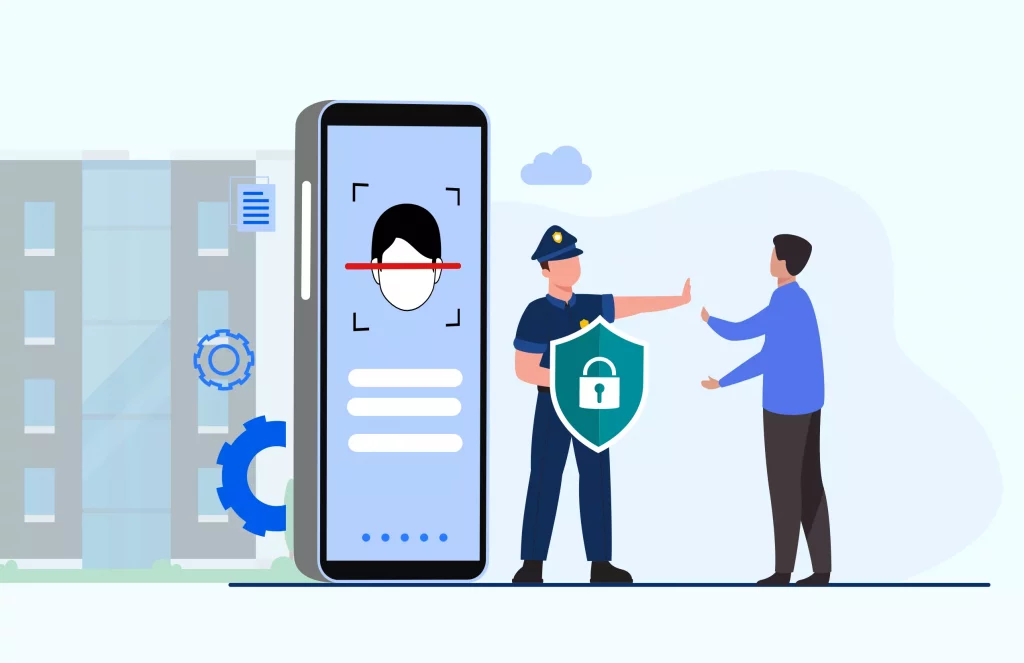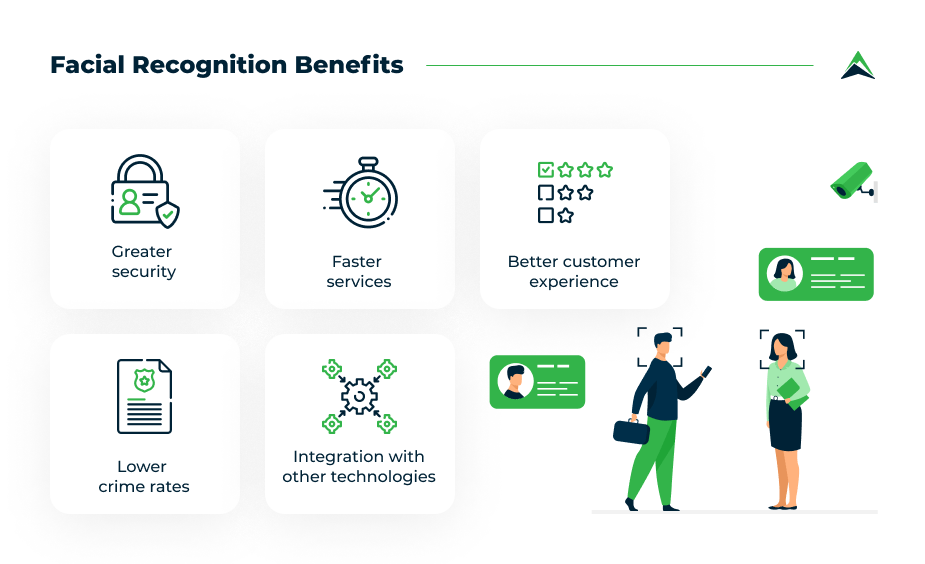
Unlocking your smartphone with just a glance, entering high-security facilities without a pass, and experiencing personalized shopping recommendations – all made possible by the remarkable technology known as facial recognition.
This cutting-edge innovation has taken the world by storm, revolutionizing industries and sectors. From security to retail, healthcare to entertainment, facial recognition is making its presence felt in ways we could have only imagined.
So buckle up as we dive into this captivating realm of facial recognition technology and explore its uses, benefits, concerns, and what lies ahead in the not-so-distant future!
Table of Contents
- The various industries and sectors utilizing facial recognition
- Benefits of using facial recognition technology
- Concerns and controversies surrounding facial recognition
- Future predictions for the use of facial recognition technology
- Ethical considerations and regulations
- Does VPN help against facial recognition?
- Conclusion: Is facial recognition a necessary tool or a potential threat?
The various industries and sectors utilizing facial recognition
Facial recognition technology has become increasingly ubiquitous in a wide range of industries and sectors. One area where it is commonly used is the security industry. Facial recognition systems can be found in airports, train stations, and other transportation hubs to identify potential threats or individuals on watch lists.
In the retail sector, facial recognition technology is being employed for various purposes. Some stores use it to track customer behavior and preferences, allowing them to tailor their marketing strategies accordingly. Others use it as a means of improving customer service by identifying regular customers and providing personalized recommendations.
The healthcare industry has also embraced facial recognition technology, particularly in hospitals and clinics. It can assist with patient identification, ensuring that medical records accurately match the correct individual. Additionally, it can aid in detecting conditions such as sleep apnea by monitoring patients’ facial expressions during sleep studies.
Education institutions have started utilizing facial recognition as well. This technology can help enhance campus security by monitoring access points and identifying unauthorized individuals entering school premises. It also enables efficient attendance tracking without the need for manual processes.
Beyond these sectors, there are numerous other applications of facial recognition technology. Law enforcement agencies utilize it for criminal investigations by analyzing surveillance footage or comparing images against databases of known suspects. Financial institutions employ this technology for identity verification when opening accounts or conducting transactions remotely.
Benefits of using facial recognition technology

Facial recognition technology has revolutionized several industries and sectors, offering numerous benefits that cannot be overlooked. One of the main advantages is enhanced security. With facial recognition systems in place, organizations can strengthen their access control measures by accurately identifying individuals and granting or denying entry accordingly. This not only helps prevent unauthorized access but also minimizes the risk of identity theft or fraud.
In addition to security, facial recognition technology has proven to be a valuable tool for law enforcement agencies. It enables quick identification and tracking of suspects, helping solve crimes more efficiently. Furthermore, it allows for proactive monitoring in public spaces, improving overall safety and deterring criminal activities.
The use of facial recognition extends beyond security applications. In retail environments, businesses can leverage this technology to personalize customer experiences through targeted advertising and tailored recommendations based on individual preferences detected from previous interactions.
Moreover, facial recognition has become instrumental in improving efficiency across various sectors such as healthcare and banking. For instance, medical professionals can utilize this technology to quickly retrieve patient records during emergencies or verify identities before administering medication or treatment.
The benefits offered by facial recognition technology are vast – from heightened security measures to improved operational efficiency across different industries – making it an invaluable asset in our increasingly digital world.
Concerns and controversies surrounding facial recognition
Concerns and controversies surrounding facial recognition technology have been gaining attention in recent years. One of the main concerns is privacy invasion. Many individuals worry that their personal information, including biometric data, could be collected and stored without their consent. This raises questions about who has access to this information and how it could potentially be used.
Another concern is the potential for misuse or abuse of facial recognition technology. There have been instances where law enforcement agencies have used facial recognition systems to identify individuals without their knowledge or consent, leading to issues of surveillance and civil liberties violations.
Accuracy is also a major concern when it comes to facial recognition technology. Studies have shown that these systems can sometimes misidentify individuals, especially those from marginalized communities or with darker skin tones. This raises concerns about bias and discrimination in algorithm design and implementation.
Furthermore, there are concerns about the lack of regulation surrounding the use of facial recognition technology. Currently, there are no clear guidelines on how this technology should be deployed or what safeguards need to be put in place to protect individual rights.
While facial recognition technology offers many benefits, such as enhanced security measures and convenience in certain industries, it is important to address these concerns and controversies surrounding its use before widespread adoption occurs
Future predictions for the use of facial recognition technology

As facial recognition technology continues to advance at a rapid pace, its potential applications seem limitless. One area where we can expect to see significant growth in the use of facial recognition is security and public safety. Imagine a world where your face becomes your key – no need for physical keys or passwords anymore! With this technology, access to buildings, vehicles, and even personal devices could be streamlined and made more secure.
Additionally, the healthcare industry may greatly benefit from facial recognition technology. It has the potential to revolutionize patient identification systems in hospitals and clinics. By accurately identifying patients using their unique facial features, medical professionals will have instant access to vital information about each individual’s medical history and allergies. This will help improve patient care by avoiding medication errors and ensuring that treatments are tailored specifically to each person.
Another exciting area for future implementation of facial recognition is retail. Brick-and-mortar stores can utilize this technology as a means of enhancing customer experience through personalized shopping recommendations based on previous purchases or browsing habits. Furthermore, it could assist retailers in preventing theft or fraudulent activities by recognizing known shoplifters or individuals with suspicious behavior.
In transportation hubs such as airports and train stations, facial recognition holds immense potential for improving security measures while streamlining passenger flow. Through quick identity verification at checkpoints, boarding processes would become faster and more efficient while maintaining high levels of security against threats.
But will these work?
However, despite these promising predictions for the future use of facial recognition technology across various industries, some concerns must be addressed along the way. Privacy issues remain a top concern since widespread adoption could potentially lead to constant surveillance without consent or knowledge.
Regulations must be put in place to ensure responsible usage of this powerful tool while safeguarding individuals’ privacy rights. Striking a balance between innovation and ethical considerations will play a crucial role in shaping how society embraces this technology moving forward.
Ethical considerations and regulations
Ethical considerations and regulations play a crucial role in the use of facial recognition technology. As this technology becomes more prevalent, concerns have arisen regarding privacy rights and potential misuse.
One ethical concern is the issue of consent. Facial recognition often involves capturing and analyzing biometric data without explicit permission from individuals. This raises questions about whether individuals should have the right to control their data, especially when it comes to sensitive information like facial images.
Another concern is accuracy and bias. Studies have shown that some facial recognition systems may be less accurate when identifying people with darker skin tones or women compared to lighter-skinned individuals or men. This can result in unfair treatment or discrimination based on inaccurate matches.
Furthermore, there are concerns about surveillance and mass monitoring. The widespread deployment of facial recognition technology could erode privacy by constantly tracking individuals’ movements in public spaces, raising fears of an Orwellian society where everyone is under constant surveillance.
Ethical Concerns
In response to these ethical concerns, many countries and organizations are implementing regulations around the use of facial recognition technology. These regulations aim to ensure transparency, accountability, and fairness in its implementation.
For example, some jurisdictions require companies using facial recognition to obtain informed consent from individuals before collecting their biometric data. Others mandate regular audits or assessments of system accuracy and performance to mitigate bias.
It’s important for policymakers and regulators to strike a balance between utilizing the benefits offered by facial recognition technology while protecting individual rights and addressing societal concerns over privacy infringement.
As we move forward into the future, ongoing discussions surrounding ethics will continue shaping legislation governing its usage across various industries and sectors.
It remains essential for stakeholders—technology developers, governments, and civil liberties advocates—to collaboratively navigate these complex issues with a focus on ensuring responsible implementation that respects individual freedoms while harnessing technological advancements for positive impact.
Does VPN help against facial recognition?
Using a Virtual Private Network (VPN) can provide some level of privacy and security when browsing the internet, but it is not specifically designed to protect against facial recognition technology. Facial recognition works by analyzing the unique features of a person’s face, often through images or video feeds, and attempting to match them to known individuals in a database.
Here are a few points to consider regarding the use of VPNs and facial recognition:
- VPNs and Anonymity: VPNs can help you hide your IP address and encrypt your internet traffic, making it more difficult for websites and online services to track your online activities. This can enhance your overall online privacy and anonymity to some extent.
- Limitations of VPNs: VPNs primarily protect your online identity and data from being intercepted by third parties, such as hackers or government surveillance agencies. They do not directly interfere with the functioning of facial recognition technology, which relies on image analysis and facial features.
- Limitations of Facial Recognition: Facial recognition systems can still operate even when a user is connected to a VPN. These systems analyze facial features, not IP addresses or network traffic, to identify individuals. They may still be able to recognize you based on your facial characteristics in images or video feeds, regardless of whether you are using a VPN.
- Additional Privacy Measures: If you are concerned about facial recognition, you can take other measures to enhance your privacy, such as wearing facial coverings (like masks or sunglasses) or avoiding sharing identifiable images on social media and public websites.
It’s important to note that the effectiveness of facial recognition systems and the privacy measures that can be used to counter them can vary widely depending on the specific technology, its capabilities, and the context in which it is being used. While VPNs can provide some degree of online privacy, they are not a guaranteed solution to protect against facial recognition.
Best VPN against Facial Recognition
HideIPVPN offers a VPN service with military-grade encryption, and high-speed servers with unlimited bandwidth.
Our service comes with shared IP addresses so that your activity can never be tied to one particular user, further protecting your privacy.

We also offer DNS leak protection, a Kill Switch, the latest VPN protocols, and a guaranteed no-log policy.
Best VPN Deal! Get HideIPVPN for $2.7/mo!
Every purchase you make comes with a 30-day money-back guarantee.
Conclusion: Is facial recognition a necessary tool or a potential threat?
As we have explored the various industries and sectors where facial recognition technology is being utilized, it is evident that this innovative tool has significant benefits. It enhances security measures, improves efficiency in identification processes, and provides convenience in various applications.
However, along with its advantages, there are concerns and controversies surrounding the use of facial recognition. Privacy issues, potential misuse of data, and biases in algorithms raise valid questions about the ethical implications of this technology. As society becomes increasingly reliant on facial recognition systems, it is crucial to establish proper regulations and guidelines to protect individual rights.
Looking ahead into the future, we can expect further advancements in facial recognition technology. Its integration into everyday life may become more prevalent as businesses find new ways to utilize its capabilities. However, striking a balance between technological innovation and safeguarding personal privacy will be crucial for its successful implementation.
In conclusion (without using these words explicitly), whether facial recognition is deemed a necessary tool or a potential threat depends on how it is used and regulated. With careful consideration of ethical considerations and appropriate legal frameworks put in place, facial recognition can continue to evolve as an invaluable asset while respecting individual rights.
Ongoing dialogue among policymakers, industry leaders,and civil society will be essential for shaping the future direction of facial recognition technology – one that maximizes its benefits while minimizing any potential risks or harm. Only through responsible deployment can we ensure that this powerful tool serves humanity’s best interests without compromising our fundamental values.



